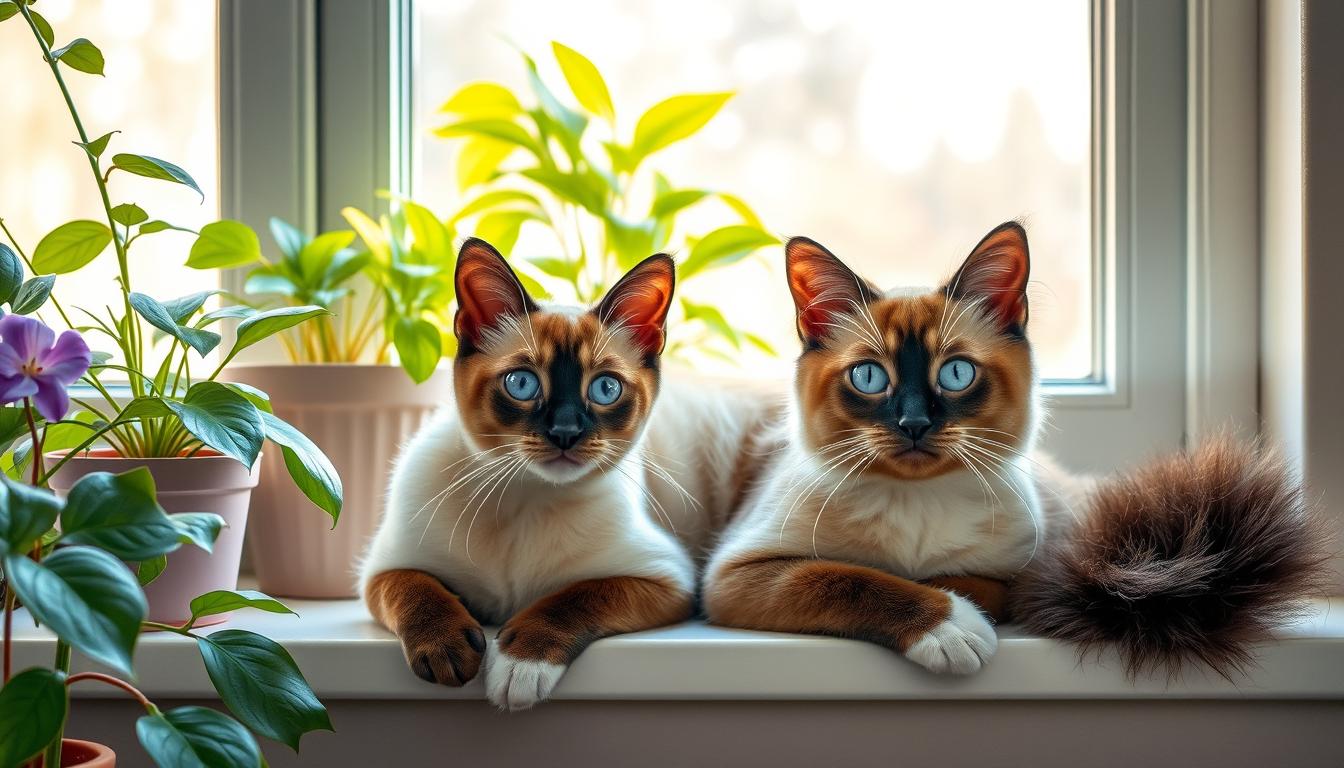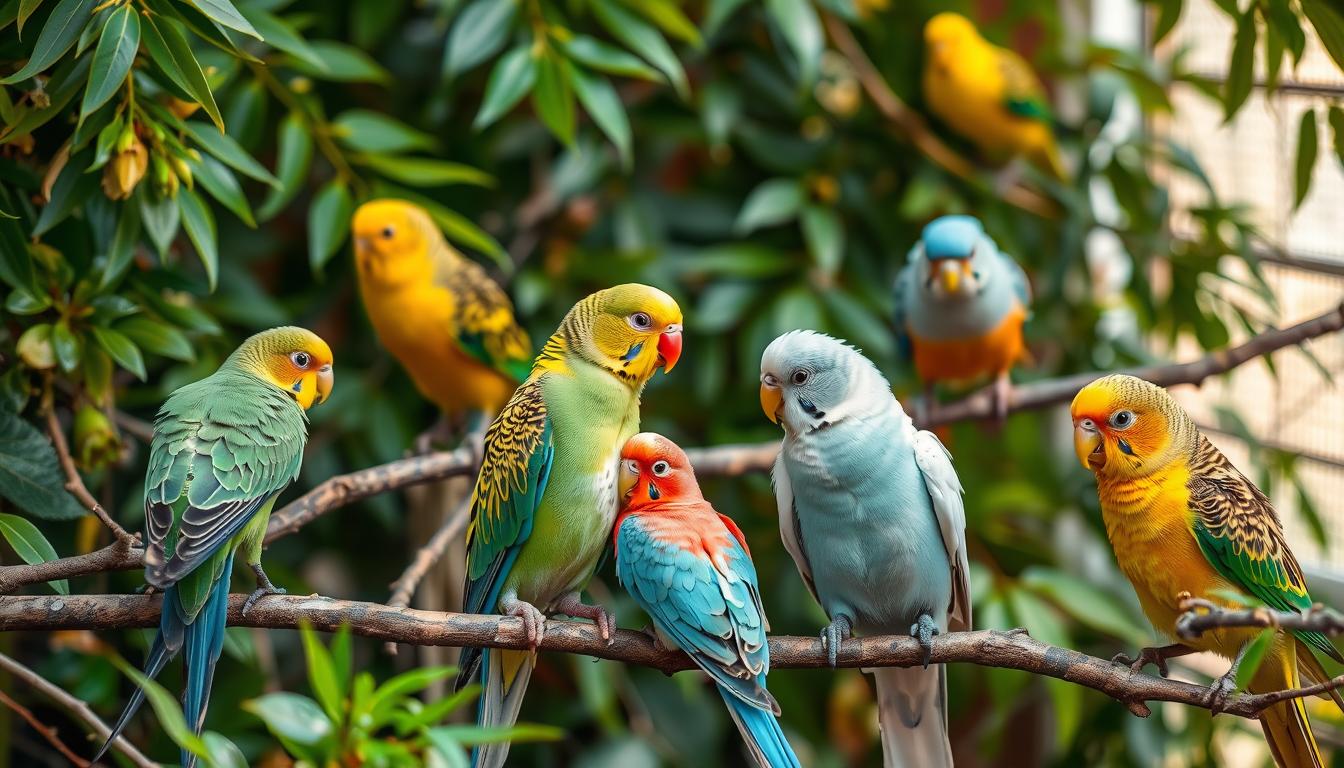Hypoallergenic Cat Breeds Siberian: Low-Allergy Pets
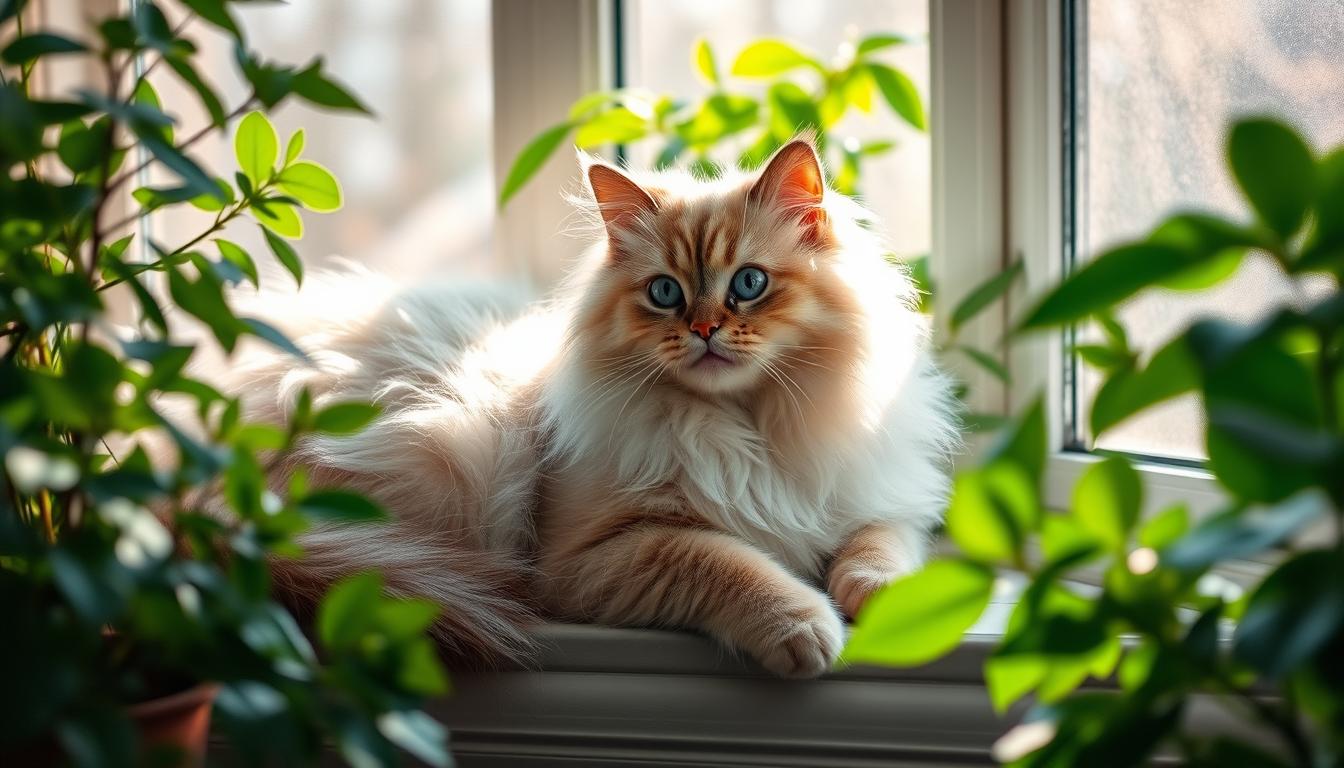
Did you know about 10% of people have pet allergies? But, some breeds like the Siberian cat make less allergen-causing proteins. This makes them great for those who want a cat without sneezing and itchy eyes.
Hypoallergenic cat breeds, like the Siberian, have beautiful looks and are gentler on allergies. They are truly allergy-friendly pets.
No cat is completely hypoallergenic, but Siberian cats are special. They are loving and can live with people who have allergies. They grow up around age 5 and live up to 15 years. This makes them a great choice for families, singles, and seniors12.
Key Takeaways
- Siberian cats produce lower levels of allergens than many other breeds.
- They reach maturity around the age of 5 and live up to 15 years.
- The average cost of a Siberian cat ranges from $1,200 to $2,500.
- Low allergy cat breeds including Siberians are perfect for families with allergic members.
- The Siberian cat stands out due to its affectionate personality and suitable size.
- Understanding the specific care needs for hypoallergenic breeds is critical for potential owners.
Understanding Hypoallergenic Cats
Understanding hypoallergenic cats is key. These cats make fewer allergens, like the Fel d 1 protein in their saliva and skin. This protein, not their fur, often causes allergies in cat owners.
Many think hypoallergenic cats don’t shed or make allergens. But, breeds like the Siberian cat have lower allergen levels. They are great for those with allergies who want non shedding cats.
What Makes a Cat Hypoallergenic?
“Hypoallergenic” means these cats make fewer allergens than regular cats. Studies with over 300 Siberian cats showed half had lower allergen levels than street cats3. Some Siberian cats had very low allergen levels, perfect for homes with severe cat allergies3.
But, all Siberians tested still had some Fel d 1 allergen. This means they’re not completely allergen-free.
Common Misconceptions About Hypoallergenic Breeds
Many believe hypoallergenic cats don’t make any allergens. But, when allergies do happen, it’s disappointing. Male and female Siberian cats with low allergen levels can still cause some allergic reactions3.
Saliva tests can accurately measure allergen levels 70-80% of the time3. It’s also true that kittens from low-allergen parents might grow up to make normal allergen levels. This shows not all offspring will have hypoallergenic traits3.
Why Choose a Siberian Cat?
Thinking about getting a new pet? A Siberian cat is a great choice. They are not only beautiful but also very gentle and loving. This makes them perfect for many homes.
The Unique Traits of Siberian Cats
Siberian cats are medium to large, with males weighing 15 to 20 pounds. Females are a bit smaller. They come from Siberia’s dense forests, a history of over 1,000 years4.
They have strong hind legs, which help them jump high. Their round eyes, often green or gold, make them look friendly4.
Affectionate and Family-Friendly Nature
Siberian cats are known for being family-friendly. They act like dogs, showing loyalty and friendship5. They live for 10 to 18 years, bringing joy and love for many years5.
They love to play and join in family activities, making them great with kids6. Plus, they are less likely to cause allergies because they produce less Fel d16. Still, they need regular grooming to manage their shedding and keep your home clean6.
Hypoallergenic Cat Breeds Siberian
If you’re thinking about getting a cat but worry about allergies, the Siberian cat might be perfect. They are known for being friendly and having beautiful coats. Plus, they are considered low-allergen cats.
Even though they shed, Siberians produce much less of the protein that causes allergies. This protein, called Fel d 1, is what often triggers allergic reactions.
Overview of the Siberian Cat Breed
Siberian cats are big and strong, with a thick, luxurious coat that needs regular grooming. They are known for their loving nature, making them excellent family pets. Their affectionate personality means they do well in homes where they get lots of attention.
As they are siberian cat allergy-friendly, many people with allergies can live with them without severe reactions.
How Siberians Produce Less Allergen
Studies show that Siberian cats have less Fel d 1 protein than other breeds. This makes them a good choice for those with cat allergies. About 50% of Siberians have much lower allergen levels, leading to fewer allergic reactions compared to other cats7.
This special trait, along with their minimal shedding, makes them a great option for those with allergies. You can learn more about other hypoallergenic cat breeds by visiting this informative link8.
Comparison with Other Hypoallergenic Breeds
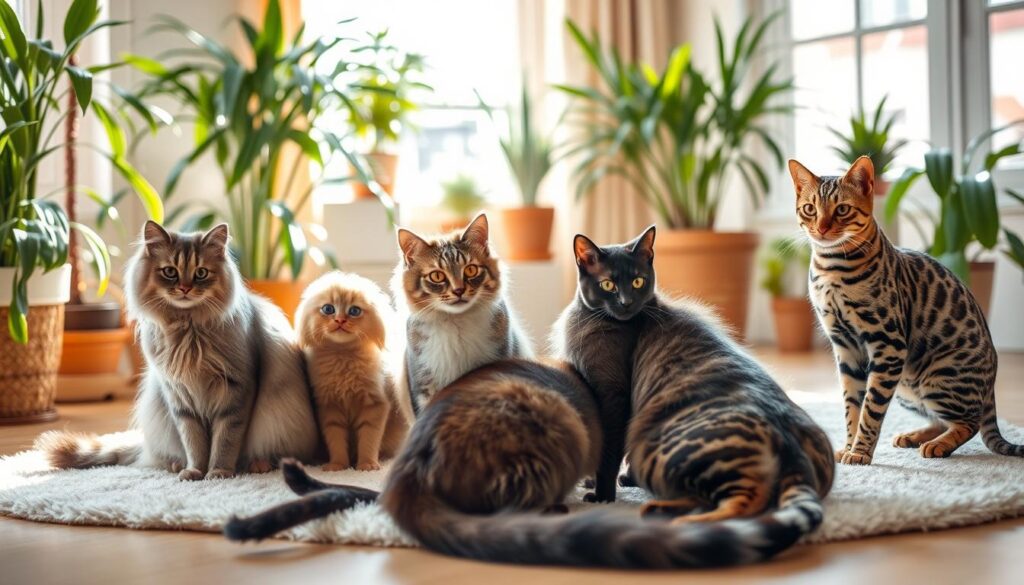
Looking for a hypoallergenic pet? You might be thinking about different cat breeds. The Siberian cat is a top choice, beating out breeds like the Russian Blue and Bengal. It’s known for being friendly and producing fewer allergens.
How Siberians Stack Up Against Other Breeds
The Siberian cat makes less Fel d 1 protein, the main allergen in cats. Breeds like the Russian Blue and Balinese also have lower allergen levels. But Siberians are more welcoming to families.
Neutered male Siberians produce even less Fel d 1. This makes them perfect for people with allergies910.
Why Choose a Siberian Over Other Hypoallergenic Cats?
Choosing a Siberian cat has many benefits. They are loving and manage allergens well. Their fur is special, making them great for families.
While other cats like the Sphynx have no fur, and the Cornish and Devon Rex need little grooming, Siberians offer both. They are among the best hypoallergenic cats out there.
Want to know more about feeding your Siberian? Check out this guide on pet food tips.
The Allergen Factor: Fel d 1
Knowing about allergens is key if you’re thinking about getting a cat. This is especially true if you or someone in your family has allergies. The main allergen from cats is Fel d 1, found in their saliva and skin. It causes 60% to 90% of allergic reactions in people, making it a big problem for those allergic to pet dander11.
Understanding Fel d 1 in Cats
Fel d 1 is a complex protein that cats produce differently. Not only do different breeds have varying levels, but individual cats do too. On average, a cat makes about 63,000 micrograms of Fel d 1. But, a female Siberian cat can make up to 200 micrograms per gram12.
This lower amount makes Siberians a better choice for those with allergies. Also, neutered cats make less Fel d 1, which helps reduce allergic reactions12.
How Siberians Mitigate Allergens
Siberian cats are special because they produce fewer allergens than many other breeds. This means they can be great friends without making allergies worse13. Regular grooming and baths with special shampoos can also help keep allergens down12.
Using HEPA filters, keeping the air fresh, and keeping your home clean can also help manage allergens12.
Care Considerations for Siberian Cats
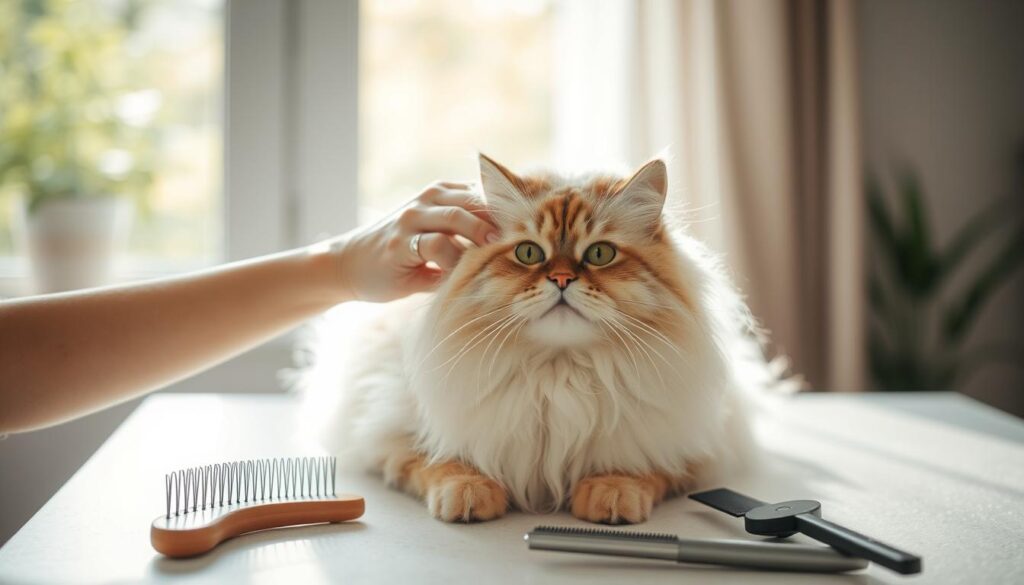
Caring for Siberian cats means paying attention to their grooming and lifestyle. They have a thick, semi-long coat that needs regular grooming. This is crucial, especially if you’re living with hypoallergenic pets and want a clean home.
Grooming Needs for Siberian Cats
Grooming Siberian cats is easy. Brush them once or twice a week to avoid matting and keep their coat healthy. In spring and fall, when they shed more, brush them more often. Occasional baths can also help keep your home clean.
Regular nail trimming and ear checks are also important. These grooming steps not only reduce allergens but also strengthen your bond with your pet.
Living with a Siberian: Tips for Allergy Sufferers
If you’re allergic to cats but want a furry friend, a Siberian might be a good choice. They produce fewer allergens than other breeds. Keeping your home clean and using hypoallergenic grooming products can help manage allergies.
By following these tips, you can enjoy the company of a Siberian without harming your health.
Starting a life with a Siberian cat? Check out this article for detailed grooming and care advice. Being well-informed helps you care for your Siberian and keep your home allergy-friendly. This way, you and your pet can live in harmony1415.
Health Benefits of Owning a Siberian Cat
Siberian cats bring many health benefits to their owners. They have a low risk of genetic diseases, thanks to their unique genes. This makes them live longer, often up to 18 years, and sometimes even 20 years or more16.
Regular vet visits are key to keeping them healthy. This helps catch any health problems early.
Longevity and Hardiness in Siberian Cats
Siberian cats live long because of their strong bodies and low genetic disease risk. They are a hardy breed but need special care to avoid diseases like hypertrophic cardiomyopathy (HCM)17. Knowing how to care for them as hypoallergenic cats helps keep them healthy.
Potential Health Concerns to Watch For
Siberian cats are usually healthy, but owners must watch for health risks. Hypertrophic cardiomyopathy is a concern, so regular vet visits are important17. A diet rich in animal protein and enough water is essential for their health16.
Their thick coat needs regular grooming to prevent matting and shedding.
Cost and Availability of Siberian Cats
Understanding the cost of a Siberian cat is key. The price varies based on lineage and breeding. If you’re searching for hypoallergenic cats, prices differ by location.
What to Expect in Terms of Price
A Siberian cat from a reputable breeder costs between $1,200 and $4,000. This depends on the cat’s background and special traits18. Rescue cats cost between $50 and $25018. Owners should also budget for:
- Monthly feeding costs of around $30 to $5018.
- Professional grooming services, which usually cost between $30 and $100 per session18.
- Initial supply costs that might range from $200 to $50018.
- A microchipping fee of $50 to $7018.
- Core vaccinations estimated at $100 to $200 for the first year18.
- Annual miscellaneous expenses recommended to be $100 to $30018.
The lifetime cost of a Siberian cat is estimated at $9,000 to $12,00018.
Where to Find a Siberian Cat
Connecting with reputable breeders is crucial. One breeder offers Siberian kittens for $2,850 to $3,200 on average19. Pet transport costs can be about $70019. Breeders often have a waiting list, with wait times under a year19. A nonrefundable deposit of $250 is usually needed to reserve a kitten20.
When considering a Siberian cat, think about all costs and breeders. Knowing the cost helps you decide if you’re ready for a new pet.
Preparing Your Home for a Hypoallergenic Pet
To welcome a hypoallergenic pet like a Siberian cat, you need to make some changes at home. Focus on reducing allergens and making your home a cozy space for both you and your new pet.
Environmental Adjustments for Allergy Sufferers
Start by choosing materials and furniture that don’t trap allergens. Having a cat-free zone, especially in your bedroom, can help lower allergen exposure21. Air ionizers and plants like spider plants can also improve air quality by cutting down on airborne allergens21.
Opt for hardwood or tile floors instead of carpet. These are easier to clean and less likely to hold onto dander.
Cleaning Tips for Reducing Allergens
Effective cleaning is key to keeping your home safe for allergy-friendly pets. Use a HEPA filter vacuum to catch pet hair and dander21. Make cleaning a regular part of your routine, including washing bedding and wiping down surfaces to reduce allergens21.
These steps will make your home more welcoming for your Siberian cat and help ease allergy symptoms. Also, don’t forget to talk to an allergist for personalized advice on managing allergies22.
| Action Item | Description | Frequency |
|---|---|---|
| Vacuuming | Use a HEPA filter vacuum cleaner to reduce allergens. | At least once a week |
| Washing Bedding | Wash all bedding, including your pet’s, to eliminate allergens. | Weekly |
| Dusting | Wipe down surfaces to remove dust and dander. | Every few days |
| Air Purifiers | Use air purifiers with HEPA filters to cleanse the air. | Continuous |
| Cat-Free Zone | Designate rooms as cat-free to limit allergic reactions. | Daily |
By following these steps, you can make your home a happy place for both you and your pet21.
Personal Experiences with Siberian Cats
Many Siberian cat owners share personal experiences that show the special bond they have with their pets. These cats are very affectionate, which creates strong connections. Families love to share their happy moments with these pets.
From cozy nights to fun playtimes, stories of hypoallergenic pets often show how Siberians fit well into various lifestyles.
Stories from Siberian Cat Owners
Many cat owners say their allergies got better after getting a Siberian cat. About 80% of them noticed a big change23. Even those with asthma found relief, with 70% saying they no longer react to allergens23.
People often say their Siberian cats are friendly and fun. They are seen as a key part of the family.
Why Others Love Their Hypoallergenic Companions
Siberian cats are well-liked for several reasons. Breeders check for health issues like HCM, making sure they are healthy and hypoallergenic24. Owners also get a one-year health guarantee and know their kittens are well cared for24.
This care makes each adoption a rewarding experience. It makes people wonder why choose hypoallergenic cats when looking for a pet.
Conclusion
Getting a Siberian cat as a pet is a great choice for those looking for hypoallergenic cats. About 50% of Siberian cats make less Fel d 1 protein than other cats. This makes them good for people with allergies25.
Also, around 15% of Siberian cats have such low Fel d 1 levels. They can live well in homes where people have severe allergies. This makes them one of the best pets for allergy sufferers25.
Siberian cats are not only good for allergies; they are also very loving and family-friendly. A study with 39 cats, including 4 Siberians, showed big differences in Fel d 1 levels. This shows Siberians can make homes more comfortable for people with allergies26.
Moreover, the strong mutations in Siberian cats could lead to even less allergen production. This could make them even better pets for those with allergies26.
In summary, Siberian cats are a great choice for families and individuals. They offer companionship and comfort without causing allergies. If you’re looking for a pet that’s both loving and hypoallergenic, a Siberian cat might be perfect for you.
FAQ
Are Siberian cats truly hypoallergenic?
What is Fel d 1 and why is it important for allergy sufferers?
Do Siberian cats shed a lot?
How can I reduce allergens in my home with a Siberian cat?
What are the key traits of Siberian cats?
How do Siberian cats compare with other hypoallergenic breeds?
What should I consider when caring for a Siberian cat?
What is the average lifespan of a Siberian cat?
How much do Siberian cats cost?
FAQ
Are Siberian cats truly hypoallergenic?
No cat is completely hypoallergenic, but Siberian cats produce less Fel d 1 protein. This protein is found in cat saliva and skin. They are a good choice for many with allergies.
What is Fel d 1 and why is it important for allergy sufferers?
Fel d 1 is a protein in cat saliva, skin, and dander. It’s the main allergen in cats. Siberians have less of this protein, which helps reduce allergic reactions.
Do Siberian cats shed a lot?
Yes, Siberian cats shed a lot, especially in spring and fall. Regular grooming helps manage their shedding and reduces allergens at home.
How can I reduce allergens in my home with a Siberian cat?
To lower allergens, clean regularly with vacuuming and air purifiers. Use hypoallergenic grooming products. Bathe your Siberian occasionally to decrease allergens.
What are the key traits of Siberian cats?
Siberian cats are affectionate and playful. They are adaptable to family life. Their loyalty makes them great companions, especially with children.
How do Siberian cats compare with other hypoallergenic breeds?
Siberian cats are known for their friendly nature and low allergen production. While other breeds like Russian Blues and Bengals are allergy-friendly, Siberians are best for families.
What should I consider when caring for a Siberian cat?
Regular grooming is key for their thick coat. Monitor their health with vet visits. Watch for conditions like hypertrophic cardiomyopathy (HCM).
What is the average lifespan of a Siberian cat?
Siberian cats live 12 to 15 years. With proper care and vet visits, they can live a happy, healthy life.
How much do Siberian cats cost?
Siberian cats cost between
FAQ
Are Siberian cats truly hypoallergenic?
No cat is completely hypoallergenic, but Siberian cats produce less Fel d 1 protein. This protein is found in cat saliva and skin. They are a good choice for many with allergies.
What is Fel d 1 and why is it important for allergy sufferers?
Fel d 1 is a protein in cat saliva, skin, and dander. It’s the main allergen in cats. Siberians have less of this protein, which helps reduce allergic reactions.
Do Siberian cats shed a lot?
Yes, Siberian cats shed a lot, especially in spring and fall. Regular grooming helps manage their shedding and reduces allergens at home.
How can I reduce allergens in my home with a Siberian cat?
To lower allergens, clean regularly with vacuuming and air purifiers. Use hypoallergenic grooming products. Bathe your Siberian occasionally to decrease allergens.
What are the key traits of Siberian cats?
Siberian cats are affectionate and playful. They are adaptable to family life. Their loyalty makes them great companions, especially with children.
How do Siberian cats compare with other hypoallergenic breeds?
Siberian cats are known for their friendly nature and low allergen production. While other breeds like Russian Blues and Bengals are allergy-friendly, Siberians are best for families.
What should I consider when caring for a Siberian cat?
Regular grooming is key for their thick coat. Monitor their health with vet visits. Watch for conditions like hypertrophic cardiomyopathy (HCM).
What is the average lifespan of a Siberian cat?
Siberian cats live 12 to 15 years. With proper care and vet visits, they can live a happy, healthy life.
How much do Siberian cats cost?
Siberian cats cost between $1,200 and $4,000. Their price depends on lineage and availability. If you’re interested, look for reputable breeders or local rescue organizations.
Can I find hypoallergenic alternatives if I can’t get a Siberian cat?
Yes, breeds like Russian Blues and Bengals are hypoallergenic. But, consider each breed’s temperament and allergen production to find the right fit for you.
,200 and ,000. Their price depends on lineage and availability. If you’re interested, look for reputable breeders or local rescue organizations.
Can I find hypoallergenic alternatives if I can’t get a Siberian cat?
Yes, breeds like Russian Blues and Bengals are hypoallergenic. But, consider each breed’s temperament and allergen production to find the right fit for you.
Can I find hypoallergenic alternatives if I can’t get a Siberian cat?
Source Links
- https://www.petmd.com/cat/general-health/hypoallergenic-cat-breeds – 12 ‘Hypoallergenic’ Cats for People With Allergies
- https://www.treehugger.com/buying-a-siberian-cat-is-it-worth-it-4868743 – Buying a Siberian Cat: Is It Worth It?
- http://www.siberianresearch.com/cat-allergies/myths-about-siberians.html – Myths about Siberians | Siberian Research
- https://www.aspcapetinsurance.com/resources/siberian-cat-facts/ – Facts About Siberian Cats | ASPCA Pet Health Insurance
- https://www.petmd.com/cat/breeds/siberian – Siberian
- https://www.catster.com/lifestyle/are-siberian-cats-hypoallergenic/ – Are Siberian Cats Hypoallergenic? Breed Facts & Allergy Tips – Catster
- https://www.shellyscats.com/hypoallergenic.html – Hypoallergenic Cats | Siberians
- https://www.purina.co.nz/find-a-pet/articles/cat-types/fur-type/hypoallergenic – Top 5 Hypoallergenic Cat Breeds | Purina
- https://www.litter-robot.com/blog/infographic-8-hypoallergenic-cat-breeds/?srsltid=AfmBOoozH4wmGj0LpSCnkYco6TY-RKtfvXSKDIAi2VYwXWsvbeW547im – Hypoallergenic Cats: Facts, Details, and Breed Guide
- https://www.omlet.us/guide/cats/choosing_the_right_cat_for_you/best_hypoallergenic_cat_breeds/ – 8 Best Hypoallergenic Cat Breeds | Choosing The Right Cat For You
- https://www.nature.com/articles/s41598-024-55464-0 – Generation of Fel d 1 chain 2 genome-edited cats by CRISPR-Cas9 system – Scientific Reports
- https://www.milehighsiberians.com/hypo-allergenic.html – Tips – Hypoallergenic Cats?
- https://pmc.ncbi.nlm.nih.gov/articles/PMC6764004/ – Influence of time and phenotype on salivary Fel d1 in domestic shorthair cats
- https://www.thesprucepets.com/siberian-cat-4178148 – The Siberian Cat Is a Gem of a Feline
- https://www.webmd.com/pets/cats/what-to-know-siberian-cat – What To Know About a Siberian Cat
- https://thecatsite.com/c/siberian-cats/ – The Siberian Cat – An In-Depth Look at This Majestic Breed – TheCatSite
- https://www.fetchpet.com/the-dig/siberian-cat – Here’s everything you need to know about Siberian cats
- https://spotpet.com/blog/breed-tips/how-much-does-a-siberian-cat-cost – What’s the Price of a Siberian Cat in 2024? | Spot®
- https://www.celestialsiberians.com/purchase-info – Siberian Kittens For Sale — Celestial Siberians
- http://www.michigansiberians.com/ – Siberian Cats
- https://thecatsite.com/threads/hypoallergenic-cat-breeds.275067/ – Hypoallergenic Cat Breeds
- https://www.beckerentandallergy.com/blog/living-with-pet-allergies – Living with Pet Allergies: Creating an Allergy-Safe Environment
- http://www.cicacattery.com/about/allergies/testimonies/testimonies.html – Cica Cattery – Testimonies
- https://thecatsite.com/threads/siberian-cats-health-issues-inbreeding.280935/ – Siberian Cats – Health Issues, Inbreeding
- https://spellboundsiberiancats.com/information/allergy-info/ – Allergy Info – Spellbound Siberian Cats
- https://pmc.ncbi.nlm.nih.gov/articles/PMC5753643/ – Polymorphism Analysis of Ch1 and Ch2 Genes in the Siberian Cat


